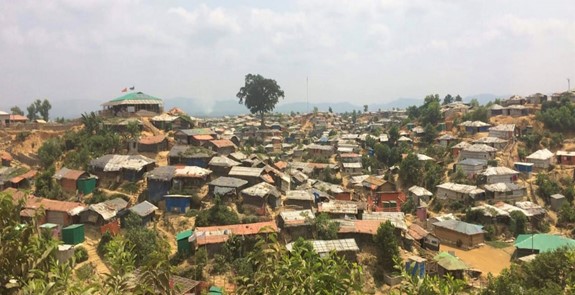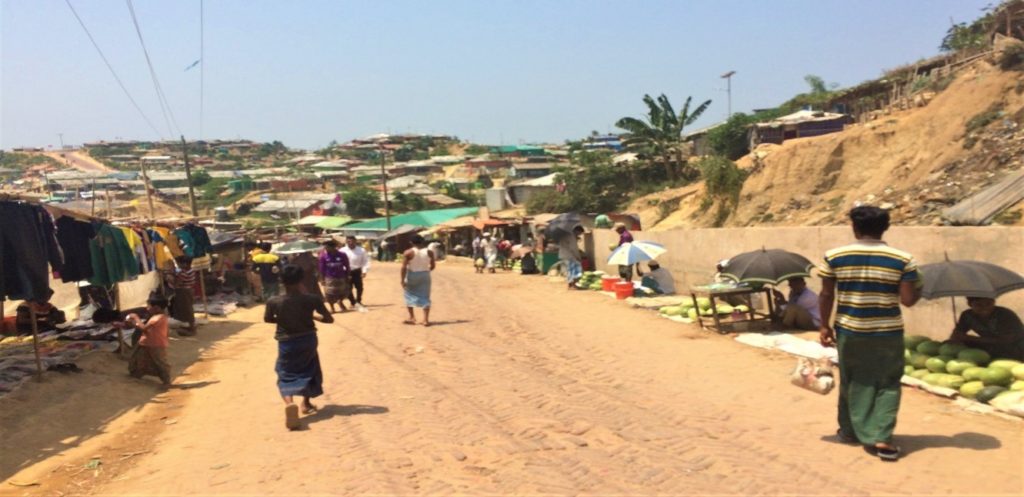During 2017, almost 750,000 Rohingya refugees entered Cox’s Bazar and now more than one million of them reside in Bangladesh. Rohingya refugees are subject to life‐long statelessness and severe physical and psychological violence, as the Myanmar government denies their citizenship and any fundamental rights. I had rare, unrestricted access to Rohingya refugee camps as an independent researcher. This independence was crucial because unless a researcher sees, feels and interacts with various actors free from the interests and influence of authorities, they cannot bring facts into the public domain. Since I was born in Chittagong and fluent in Chittagonian language, which is spoken by Rohingya refugees, I was able to have deep conversations with refuges and locals in Cox’s Bazar (see my original research published in Journal of Management Studies).
On 31 December 2017, when I entered the Kutupalong camp, one of the largest of 34 camps, I felt that refugee camps resemble a military-industrial complex where everything is organized in a systemic manner (but with the idea to exercise power and control mechanisms that only serve interests of a few). These refugee camps have tiny and torn shelters housing 10-15 members of a refugee family. There are stations to distribute basic rations (rice, lentils, and oil and gas for cooking). There are a few well-built roads across the camps, which ensures trucks with rations or UN convoys are mobile. However, what struck me most in these camps was the human potentials of the refugees which are yet to be fully realized. There are small stores linking to refugee houses—representing refugee initiatives to develop ad-hoc bazars to sell basic goods and services. Aspects of these were possible thanks to local people who wanted to expand their business potentials through the refugees. Refugees are interested in developing their economic lives because they want to fulfil their desire to live a decent life in the most depressing setting, where everything they want to do legitimately (e.g., trade, education, interaction with relatives outside the camps through mobile network) is difficult due to restrictions imposed by authorities.
Despite this, refugees are eager to develop bazars/markets as source of their potentials to develop capabilities and generate income. Most of their early investment came through the sale of rations or their valuable/personal belongings to locals. However, I found a significant level of corruption that hinders possibilities of a truly functional market where ordinary locals and refugees can trade and benefit each other. Local elites such as politicians, landlords and owners of larger enterprises see the ad-hoc markets as potential dumping grounds for expired and abandoned accessories/products that are not saleable in the mainland market. Also, these elites profited substantially from their involvement in tenders to deliver rations and supply other services with some UN organizations’ agents and powerful NGOs. These were visible to ordinary locals who neither have access to tender businesses nor deliver rations (refugees claim some rations are stolen and never reach them); rather, they find that due to illegitimate tender and business practices, the crime rates (e.g., drugs, human trafficking, under-aged sex-work, child abduction) rise.
Further complications arise as (inter)national NGOs and corporations tender bids to UN agencies for various projects and frequently hire foreign consultants with limited knowledge and understanding of refugee culture and language to engage with refugees in development projects but who are in a position to dictate the lives of these groups. Again, locals find that heavy presence of UN and NGO employees (with more disposable income) imposes pressure on the local economy. For example, the accommodation and grocery costs increase significantly as higher numbers of UN/NGO officials consume/use the local infrastructure that has limited capacity to accommodate them, meaning that ordinary locals confer blame to the refugees.
Until a smooth repatriation process takes place and Myanmar government reinstates fundamental rights of the Rohingya, purposeful interventions to reduce the suffering among ordinary locals and refugees remain paramount.
First, I argue that refugee camps require coordinated and regulated cooperative markets where both ordinary locals and refugees can trade. In such markets, a transparent governance system would benefit refugees. Regulations to oversee the quality of products in such places has importance because for instance if expired/illegitimate medicines are sold to refugees this has long-term negative consequences for refugee health. UN agencies have moral duties to ensure enforceable governance systems where refugees’ and locals’ voices are considered since such agencies are accountable to their funders.
Second, it is imperative to ensure transparency of all tender businesses and ration distributions that take place. While UN agencies have obligations to ensure transparency, I found evidence and allegations about how contracts are distributed illegitimately. Transparent processes ensure that ordinary locals and refugees are informed. Also, the wider public must have access to data and information to see how money is spent and for what purposes, and how that really benefits the refugees.
Third, Bangladesh government must coordinate with UN agencies to ensure the proposed cooperative market is functional. The government must not see their potential open-mindedness as a threat to the nation’s sovereignty or a barrier to repatriate the refugees in Myanmar. If refugees are well-educated, trained, and have opportunities to enhance their capabilities, this ultimately benefits the Bangladesh economy, and also fosters refugees’ empowerment. Refugees would then be more than happy to go back to their own country. Also, such cooperative markets can reduce crime because unless refugees have meaningful lives, they may always be prone to illegal activities to generate income, simply to survive.
Most importantly, Bangladesh government’s preparation to (forcefully) relocate about 100,000 refugees from Cox’s Bazar to the silt island of Bhasan Char (prone to cyclone and flooding; where government has been building brick houses), is a grave mistake. This inhumane process would simply bring more miseries to the already vulnerable refugees and violate refugees’ basic rights and desire to live a decent life with their families/neighbors/friends in close proximity. Often tiny, torn homes are better than well-built palaces since nobody including refugees wants to live a violated, undignified and imprisoned life without choices.
Acknowledgement: I sincerely thank Christopher Wickert for his encouragement to write this piece.



Beautifully written synopsis, worth recognition. It inevitably sheds light on the existence of hegemonic powers at both the global (UN and international NGOs) and local (Bangladeshi government) dimensions and how they indirectly merge at the detriment of refugees. Astonishing that the Bangladeshi government, against all odds, opted to relocate about 100,000 “voluntary” Rohingyas to Bhasan Char, an unsafe island that did not even exist before 2006. Please continue your research on this important topic. More awareness is needed going forward.
Very helpful to focus on the action that needs to be taken by policy-makers and other influential social actors to allow refugees to realize their potential as fully capable, albeit displaced bodies. Discourses should shift from merely empathizing to vital action that restores the dignity of refugees and allows them to have the same opportunities as ‘everyone’ else. Your work is distinctly challenging and inspiring Rashedur Chowdhury.
Wonderful piece, and sheds light on and facts of the happenings in Rohingya Refugee Camp.
The corruption, selfishness and discrimination/marginalization really dampens the potential refugees have, and to what ends?
One can only wonder if this is the case globally.